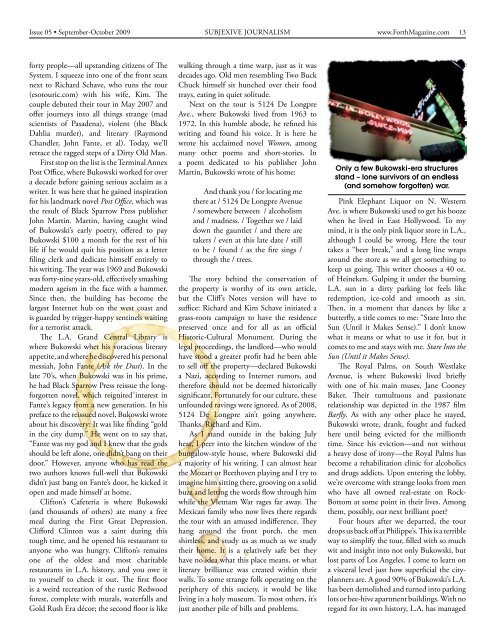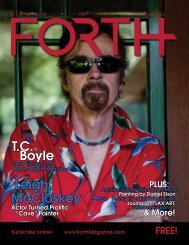John Lithgow: Painter James Ellroy - FORTH Magazine
John Lithgow: Painter James Ellroy - FORTH Magazine
John Lithgow: Painter James Ellroy - FORTH Magazine
Create successful ePaper yourself
Turn your PDF publications into a flip-book with our unique Google optimized e-Paper software.
Issue 05 • September-October 2009 SUBJExIVE JOURNALISM<br />
www.Forth<strong>Magazine</strong>.com 1<br />
forty people—all upstanding citizens of The<br />
System. I squeeze into one of the front seats<br />
next to Richard Schave, who runs the tour<br />
(esotouric.com) with his wife, Kim. The<br />
couple debuted their tour in May 2007 and<br />
offer journeys into all things strange (mad<br />
scientists of Pasadena), violent (the Black<br />
Dahlia murder), and literary (Raymond<br />
Chandler, <strong>John</strong> Fante, et al). Today, we’ll<br />
retrace the ragged steps of a Dirty Old Man.<br />
First stop on the list is the Terminal Annex<br />
Post Office, where Bukowski worked for over<br />
a decade before gaining serious acclaim as a<br />
writer. It was here that he gained inspiration<br />
for his landmark novel Post Office, which was<br />
the result of Black Sparrow Press publisher<br />
<strong>John</strong> Martin. Martin, having caught wind<br />
of Bukowski’s early poetry, offered to pay<br />
Bukowski $100 a month for the rest of his<br />
life if he would quit his position as a letter<br />
filing clerk and dedicate himself entirely to<br />
his writing. The year was 1969 and Bukowski<br />
was forty-nine years-old, effectively smashing<br />
modern ageism in the face with a hammer.<br />
Since then, the building has become the<br />
largest Internet hub on the west coast and<br />
is guarded by trigger-happy sentinels waiting<br />
for a terrorist attack.<br />
The L.A. Grand Central Library is<br />
where Bukowski whet his voracious literary<br />
appetite, and where he discovered his personal<br />
messiah, <strong>John</strong> Fante (Ask the Dust). In the<br />
late 70’s, when Bukowski was in his prime,<br />
he had Black Sparrow Press reissue the longforgotten<br />
novel, which reignited interest in<br />
Fante’s legacy from a new generation. In his<br />
preface to the reissued novel, Bukowski wrote<br />
about his discovery: It was like finding “gold<br />
in the city dump.” He went on to say that,<br />
“Fante was my god and I knew that the gods<br />
should be left alone, one didn’t bang on their<br />
door.” However, anyone who has read the<br />
two authors knows full-well that Bukowski<br />
didn’t just bang on Fante’s door, he kicked it<br />
open and made himself at home.<br />
Clifton’s Cafeteria is where Bukowski<br />
(and thousands of others) ate many a free<br />
meal during the First Great Depression.<br />
Clifford Clinton was a saint during this<br />
tough time, and he opened his restaurant to<br />
anyone who was hungry. Clifton’s remains<br />
one of the oldest and most charitable<br />
restaurants in L.A. history, and you owe it<br />
to yourself to check it out. The first floor<br />
is a weird recreation of the rustic Redwood<br />
forest, complete with murals, waterfalls and<br />
Gold Rush Era décor; the second floor is like<br />
walking through a time warp, just as it was<br />
decades ago. Old men resembling Two Buck<br />
Chuck himself sit hunched over their food<br />
trays, eating in quiet solitude.<br />
Next on the tour is 512 De Longpre<br />
Ave., where Bukowski lived from 196 to<br />
1972. In this humble abode, he refined his<br />
writing and found his voice. It is here he<br />
wrote his acclaimed novel Women, among<br />
many other poems and short-stories. In<br />
a poem dedicated to his publisher <strong>John</strong><br />
Martin, Bukowski wrote of his home:<br />
And thank you / for locating me<br />
there at / 512 De Longpre Avenue<br />
/ somewhere between / alcoholism<br />
and / madness. / Together we / laid<br />
down the gauntlet / and there are<br />
takers / even at this late date / still<br />
to be / found / as the fire sings /<br />
through the / trees.<br />
The story behind the conservation of<br />
the property is worthy of its own article,<br />
but the Cliff’s Notes version will have to<br />
suffice: Richard and Kim Schave initiated a<br />
grass-roots campaign to have the residence<br />
preserved once and for all as an official<br />
Historic-Cultural Monument. During the<br />
legal proceedings, the landlord—who would<br />
have stood a greater profit had he been able<br />
to sell off the property—declared Bukowski<br />
a Nazi, according to Internet rumors, and<br />
therefore should not be deemed historically<br />
significant. Fortunately for our culture, these<br />
unfounded ravings were ignored. As of 200 ,<br />
512 De Longpre ain’t going anywhere.<br />
Thanks, Richard and Kim.<br />
As I stand outside in the baking July<br />
heat, I peer into the kitchen window of the<br />
bungalow-style house, where Bukowski did<br />
a majority of his writing. I can almost hear<br />
the Mozart or Beethoven playing and I try to<br />
imagine him sitting there, grooving on a solid<br />
buzz and letting the words flow through him<br />
while the Vietnam War rages far away. The<br />
Mexican family who now lives there regards<br />
the tour with an amused indifference. They<br />
hang around the front porch, the men<br />
shirtless, and study us as much as we study<br />
their home. It is a relatively safe bet they<br />
have no idea what this place means, or what<br />
literary brilliance was created within their<br />
walls. To some strange folk operating on the<br />
periphery of this society, it would be like<br />
living in a holy museum. To most others, it’s<br />
just another pile of bills and problems.<br />
Only a few Bukowski-era structures<br />
stand – lone survivors of an endless<br />
(and somehow forgotten) war.<br />
Pink Elephant Liquor on N. Western<br />
Ave. is where Bukowski used to get his booze<br />
when he lived in East Hollywood. To my<br />
mind, it is the only pink liquor store in L.A.,<br />
although I could be wrong. Here the tour<br />
takes a “beer break,” and a long line wraps<br />
around the store as we all get something to<br />
keep us going. This writer chooses a 0 oz.<br />
of Heineken. Gulping it under the burning<br />
L.A. sun in a dirty parking lot feels like<br />
redemption, ice-cold and smooth as sin.<br />
Then, in a moment that dances by like a<br />
butterfly, a title comes to me: “Stare Into the<br />
Sun (Until it Makes Sense).” I don’t know<br />
what it means or what to use it for, but it<br />
comes to me and stays with me. Stare Into the<br />
Sun (Until it Makes Sense).<br />
The Royal Palms, on South Westlake<br />
Avenue, is where Bukowski lived briefly<br />
with one of his main muses, Jane Cooney<br />
Baker. Their tumultuous and passionate<br />
relationship was depicted in the 19 7 film<br />
Barfly. As with any other place he stayed,<br />
Bukowski wrote, drank, fought and fucked<br />
here until being evicted for the millionth<br />
time. Since his eviction—and not without<br />
a heavy dose of irony—the Royal Palms has<br />
become a rehabilitation clinic for alcoholics<br />
and drugs addicts. Upon entering the lobby,<br />
we’re overcome with strange looks from men<br />
who have all owned real-estate on Rock-<br />
Bottom at some point in their lives. Among<br />
them, possibly, our next brilliant poet?<br />
Four hours after we departed, the tour<br />
drops us back off at Philippe’s. This is a terrible<br />
way to simplify the tour, filled with so much<br />
wit and insight into not only Bukowski, but<br />
lost parts of Los Angeles. I come to learn on<br />
a visceral level just how superficial the cityplanners<br />
are. A good 90% of Bukowski’s L.A.<br />
has been demolished and turned into parking<br />
lots or bee-hive apartment buildings. With no<br />
regard for its own history, L.A. has managed




